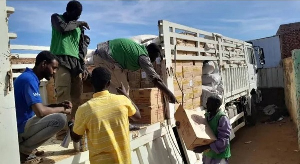The Chief Executive Officer of African Arts and Culture Company, Mr Stanley Felten says Africa abound in arts and craft, which should be harnessed to boost their economies and create employment for the teeming unemployed youth.
He said exploiting the potentials in African artifacts could serve as a springboard for sustainable development and, therefore, urged African governments to invest in the youth through sustainable skill training in arts and craft.
Mr Felten, who is a traditional wood carver, made the call in an interview with the Ghana News Agency (GNA) at the Sixth African Gift Fair in Accra, on Saturday, which showcased more than 24,000 exotic and modern African artefacts at the African Market Shopping Centre.
The fair, which started from May 17-May 27, brought together exhibitors from Ghana and other African countries, who exhibited various crafts and arts works including sculptures, African fabrics and fashion, beads, paintings and fine arts and pottery.
Others items showcased included ceramic wares, leather craft and antiques at affordable prices with flexible terms of payment.
Mr Felten urged the Tourism and Education Ministries, to encourage regular organised trips for schools to the African Market as part of efforts to promote domestic tourism, since this would go a long way to change the way students think about the arts industry and encourage them to build careers from it.
He said a study of more 10,000 students showed that a one-hour trip to an art museum boosts their drive, focus and concentration.
In addition, it showed that children with arts and craft training performed better in mathematics, language and reading, while an art lesson increased brain plasticity, fluid intelligence and intelligent quotient of students.
When the GNA interacted with some exhibitors, Mr Raymond Sunkwa Narh, a beads designer, said although he learnt engineering he had found a career in beads-making because it was very profitable,
He said he had customers from South Africa, Australia and US, who order beads from him.
“I have gone to these countries to exhibit my products and some buyers also recommended me to their friends, who subsequent contact me for business transactions”
Mr Narh, who hailed from Krobo Adumase in the Eastern Region, said he had trained more than 20 youth in beads-making who were making living out of it.
He appealed to government to support beads designers with soft loans to enable them to expand their businesses in order to reduce the youth unemployment in the country.
Another exhibitor, Madam Joana Korkor Bio, who exports artefacts, said the business of exporting African artefacts like drums, sandals, bags, beads, among others, had been very profitable.
She encouraged the youth to venture into exporting artefacts, saying “if you are determined to shine, you don’t need to wait on someone, you can begin from somewhere and you will go far”.
Mr Daley Yao Sinclair, a wood carver with more than 30 years’ experience, said he carved masks with African origin, human figures, tables, animals, among others, ranging from GH?50.00 to GH?5,000.00.
He said both domestic and foreign tourists patronised the items, saying one needed to be creative in order to stay in business.
Mr. Sinclair indicated that he had trained many people and was prepared to train the youth who were interested in learning the profession.
African Market Shopping Centre was established in 2001 as the hub of authentic artefacts produced by artisans with various collection of artefacts across the world.
A tour of the centre revealed artisans undertaking carving, beads-makers and kente weavers at work with large collection of artefacts with historical meanings linked with the way of life of the African people and their relationships with their environment translated into their cultural heritage.
Click to view details



Business News of Sunday, 28 May 2017
Source: GNA

















